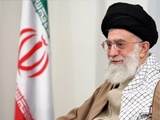|
|
TODAY.AZ / World news
Iran's leader reiterates right to veto Ahmadinejad decisions
25 April 2011 [11:32] - TODAY.AZ
 Iran's Supreme Leader Ayatollah Ali Khamenei on Saturday reiterated his constitutional right to veto any decisions by President Mahmoud Ahmadinejad he considered as not being in line with national interests, dpa reported.
Iran's Supreme Leader Ayatollah Ali Khamenei on Saturday reiterated his constitutional right to veto any decisions by President Mahmoud Ahmadinejad he considered as not being in line with national interests, dpa reported.Khamenei, who, according to the constitution, has the final say on all state affairs, vetoed last week Ahmadinejad's decision to replace the country's intelligence chief, Heydar Moslehi.
The issue led to speculations of a dispute between the leader and president, with several influential ayatollahs calling on Ahmadinejad to follow the leader's orders and let Moslehi stay in the intelligence service.
"I principally have no intention to get involved in affairs related to the government, but I do whenever I consider a decision as not being expedient as in the recent case (of the intelligence chief)," the ayatollah said in a speech broadcast on state television.
The leader firmly supported Ahmadinejad following his 2009 re- election, although the vote itself was overshadowed by fraud charges.
Moslehi unexpectedly submitted his resignation last week, and it was immediately accepted by Ahmadinejad.
Local press speculated that there was a dispute between the leader and the president over the work of the intelligence service, but gave no detailed elaborations.
Neither Ahmadinejad nor Moslehi had yet reacted to Khameini's decision and it was still not clear whether the resignation was part of a new plan by the president to reform the intelligence apparatus.
Iran has been internationally isolated and sanctioned, not only due to its controversial nuclear programmes, but also for alleged violations of human rights, especially with regards to suppression of opposition groups and the right to hold protests.
The two main opposition leaders, Mehdi Karroubi and Mir-Hossein Moussavi, together with their wives, have been under house arrest since February. Even close relatives are not allowed to visit them on a regular basis.
Moslehi was a close aide to Ahmadinejad and had pursued an uncompromising line in dealing with the opposition.
There was some speculation that the president's move to sack him could be an effort to at least improve the human rights record of his government, since Ahmadinejad is not expected to make any concessions in the nuclear dispute with the world powers.
/Trend/
URL: http://www.today.az/news/regions/85007.html
 Print version
Print version
Views: 1612
Connect with us. Get latest news and updates.
See Also
- 26 February 2026 [21:22]
President Erdo?an praises security forces at Ramadan iftar in Be?tepe - 26 February 2026 [20:19]
Rubio: No military solution to war in Ukraine - 26 February 2026 [19:50]
Turkiye unveils Samsun-Trabzon high-speed rail project cutting travel hours - 26 February 2026 [19:21]
WEF President Borge Brende steps down following Epstein-linked inquiry - 26 February 2026 [18:42]
El Salvador issues Bitcoin passports to lure global crypto elite - 26 February 2026 [13:37]
Pashinyan rejects calls to oust Russian military base from Armenia - 26 February 2026 [12:36]
Dollar credibility test after Trump’s 15% tariff threat - 26 February 2026 [11:48]
Iran’s FM says Trump has ‘fallen victim to fake news’ over missile claims - 26 February 2026 [11:30]
Russia faces mounting battlefield strain as losses outpace recruitment - 26 February 2026 [09:00]
Space umbrella maps Magnetic Shield
Most Popular
 Azerbaijani NGOs urge UK parliament to halt “biased” inquiry on Karabakh
Azerbaijani NGOs urge UK parliament to halt “biased” inquiry on Karabakh
 US top general Caine thinks war with Iran can be 'easily won'
US top general Caine thinks war with Iran can be 'easily won'
 Former UK ambassador Peter Mandelson detained in London over Epstein-linked probe
Former UK ambassador Peter Mandelson detained in London over Epstein-linked probe
 President Ilham Aliyev orders additional measures to improve drinking water supply in Nakhchivan
President Ilham Aliyev orders additional measures to improve drinking water supply in Nakhchivan
 Remote privatization: how Ruben Vardanyan "distributes" earth from camera
Remote privatization: how Ruben Vardanyan "distributes" earth from camera
 Construction materials output jumps sharply in January
Construction materials output jumps sharply in January
 Lords and baronesses got entangled in controversy over “Armenian question
Lords and baronesses got entangled in controversy over “Armenian question
